Tehran Claims NATO Expansion Eastward Root Cause Of Ukraine War

Iran’s foreign minister claims that the West accuses Tehran of supplying drones to Russia to use against Ukraine, because it wants to “legitimize” its military assistance to Kiev.

Iran’s foreign minister claims that the West accuses Tehran of supplying drones to Russia to use against Ukraine, because it wants to “legitimize” its military assistance to Kiev.
In a phone conversation with UN Secretary-General Antonio Guterres, Hossein Amir-Abdollahian said that NATO’s decision to expand eastward was wrong and that was the root cause of the Ukraine war.
However, it is not clear from Iranian media reporting how Guterres reacted to the Iranian minister’s comments and in what context he made those comments.
Earlier, Amir-Abdollahian had acknowledged that Tehran “sold very few Iranian drones in the framework of defense cooperation with Russia 11 months before the start of the Ukraine war.”
He also warned that that Tehran believes diplomacy and dialogue are the best option, but the Islamic Republic will never be “tight-handed regarding other options.”
Russia has been using Iranian drones and missiles in its air attacks against Ukraine. In October, it targeted Ukraine’s civilian energy infrastructure, plunging it into blackouts as the winter cold began.
Amid international outcry over the Islamic Republic’s supply of drones and ballistic missiles for the Russian invasion, Ukrainian President Volodymyr Zelenskiy told a meeting of UN security council November 23, that the attacks are “an obvious crime against humanity” adding that Kyiv would put forward a resolution condemning “any forms of energy terror”.
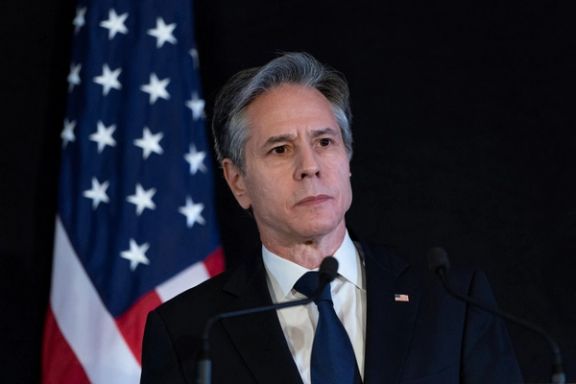
The United States on Friday designated China, Iran and Russia, among others, as countries of particular concern under the Religious Freedom Act over severe violations.
US Secretary of State Antony Blinken in a statement said those designated as countries of particular concern - which also include North Korea and Myanmar - engaged in or tolerated severe violations of religious freedom.
"Around the world, governments and non-state actors harass, threaten, jail, and even kill individuals on account of their beliefs," Blinken said in the statement.
"The United States will not stand by in the face of these abuses."
He added that Washington would welcome the opportunity to meet with all governments to outline concrete steps for removal from the lists.
Washington has increased pressure on Iran over the brutal crackdown on protesters. Women have waved and burned headscarves - mandatory under Iran's conservative dress codes - during the demonstrations that mark one of the boldest challenges to the Islamic Republic since the 1979 revolution.
The United Nations says more than 300 people have been killed so far and 14,000 arrested in protests.
United Nations experts have also called on Iran to stop persecution and harassment of religious minorities and end the use of religion to curtail the exercise of fundamental rights.
The Baha’i community is among the most severely persecuted religious minorities in Iran, with a marked increase in arrests and targeting this year, part of what the UN experts called broader policy of targeting dissenting beliefs or religious practices, including Christian converts and atheists.
Reporting by Reuters
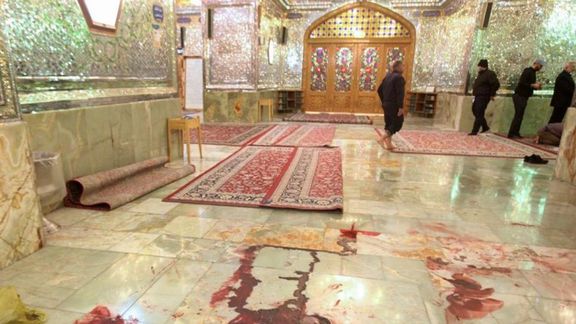
Hacked documents recently released have cast serious doubts on the official account of a terrorist attack on a shrine in Iran last month which claimed 15 victims.
The documents are several reports prepared by the IRGC’s media arm, Fars news agency, which were marked “top secret” indicate that the author believed at least parts of Iran's several intelligence organizations had knowledge of an imminent terrorist attack but did not take any action to stop it.
The documents were acquired by the hactivist group Black Reward recently which provided them to the media. These include both hearsay and excerpts from various media outlets on important political issues.
One of the reports says information provided by a Syrian group, Iran’s intelligence ministry had arrested three Taliban members who were planning terrorist operations on Shiite shrines.
The date of the arrest is not mentioned in the report which was written in the aftermath of the attack on Shahcheragh shrine in Shiraz on October 26.
Hours after the attack, Reuters quoted a statement from an ISIS telegram channel saying that the group claimed responsibility. ISIS also released a statement through its affiliated Amaq news agency and said one of its members had targeted groups of Shiite “infidels inside the shrine.”
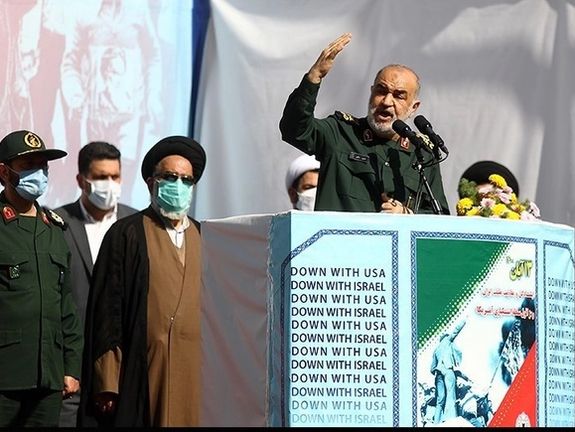
Many Iranians, however, have been very skeptical of the official account. They suspect the government of complicity with ISIS in the attack, to create its own narrative and martyrs to divert attention from fierce antigovernment protests.
The suspicion was partly due to the coincidence of the shooting with the 40th-day memorial for Mahsa Amini for which the opposition planned large widespread protests. Many also said this could be an excuse for blaming protesters for causing insecurity and justifying harsher suppression of their movement.
The author said some members of a terrorist group which was behind the Shiraz shooting had been arrested “several weeks before” with 18 kilos of explosives and recounted a rumor “in some political circles” about Salami’s decision to sack the IRGC commander of Shiraz.
He added, in different font, that the decision is believed to have been taken “because IRGC had prior knowledge of the attack on Shahcheragh”. The metadata of the document created November 11 indicates that this sentence was added by the author himself and was not a later addition by someone else.
The author of one of these secret documents wrote that the shooter, a citizen of Tajikistan, was taken down by an IRGC security agent who “happened to be present there for prayers.” The agent took his weapon from the lockers at the security gate, after hearing the shots, and rushed to encounter the shooter, he wrote, adding that the shooter had been to Afghanistan twice and taken the oath of loyalty to ISIS. He also wrote that even a police team that arrived at the shrine after the shooting had only been in the area for another operation.
According to the same document, the shooter was helped by an Afghan citizen residing in Tehran who stayed out of the shrine during the shooting and claims he was arrested in Tehran adding that the commander of the operation, a citizen of the Republic of Azerbaijan who had entered Iran legally on a visa, was also arrested on his way to Tehran.
According to another document also prepared for Salami’s attention, it has been claimed that the intelligence ministry had identified the Afghan member of the group who was arrested in Tehran “on the day of the incident” but did not announce the news “to gather more intelligence on the group.”
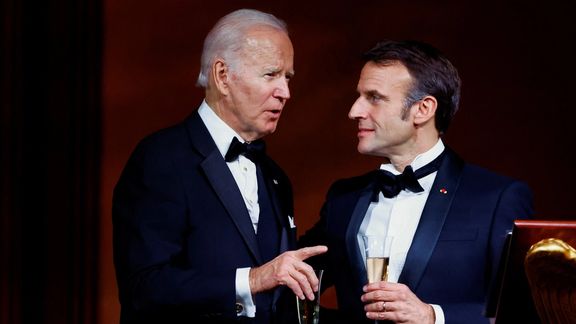
A joint statement marking French President Emmanuel Marcon’s visit to the White House expressed “respect for the Iranian people, in particular women and youth.”
With an array of celebrities at a red-carpeted state dinner Thursday, Secretary of State Antony Blinken told France 2 TV he would support the French team if the United States were knocked out of the World Cup. The joint presidential statement called France the US’s oldest ally.
The two countries were at one in supporting global human rights and in Middle East policy, the presidents’ statement said. This included a “just solution to the Syrian conflict,” where US troops remain in the north east, backing the Abrahamic Accords, by which some Arab states have recognized Israel ahead of Palestinian statehood, and a determination that “Iran can never develop or acquire a nuclear weapon.”
While the statement expressed commitment to “democratic values,” respect for international law, and international cooperation to address Iran’s “nuclear escalation,” the Washington political mood is increasingly polarizing the US and western Europe on one side, against Iran, China, and Russia on the other.
Republicans and Democrats are vying to push harder. Senator Mario Rubio, an advocate of more US weapons for Israel, Wednesday demanded that President Joe Biden look into whether the Chinese tech company Tiandy’s involvement in Iran “raises serious questions about whether its products are being used against peaceful Iranian protesters.”
‘Barbaric treatment’
In a 20-minute interview for CNN, former secretary of state Hillary Rodham Clinton envisaged US foreign policy as a struggle for women’s rights. Highlighting violations by Russia, Iran and the Afghan Taliban, Clinton called for an “absolute rejection of using sexual attack as a weapon of war,” for holding leaders accountable for “barbaric treatment,” and for stepping up sophisticated arms supplies to Ukraine, including from Israel, whose new government needed to understand “Iran and Russia have made an alliance.”
Clinton explained her approach as secretary of state to protests in Iran after the disputed 2009 presidential election as due to intelligence assessments that “overt American support would actually hurt” and that “behind the scenes” activity was better. “Now it’s very different, what’s happening now deserves our full-throated support,” she said.
“I would not be negotiating with Iran on anything right now, including the nuclear agreement,” Clinton continued. With the US withdrawal in 2018 from the 2015 Iran nuclear agreement, “that horse is out of the barn,” she said, while the International Atomic Energy Agency (IAEA) had lost its “eyes” on Iran’s nuclear program as Tehran reduced the agency’s access in response to US sanctions and attacks on its atomic sites.
Clinton suggested that maintaining US ‘maximum pressure’ sanctions was to force “regime change” but rather to spark “internal discussions” in Iran, “not just [within] the government … but [within] the clerics.” This tied in with Rob Malley, the White House special envoy for Iran, telling Foreign Policy magazine in an interview this week that “the Iranian system is divided.”
‘Active diplomatic track’
The Biden administration’s approach is not without critics. Much of the ‘global south’ is increasingly wary of US ‘exceptionalism,’ accusing the US of hypocrisy and double standards. The US-France presidents’ statement expressed support for the International Criminal Court, which Washington has refused to join. Both India and Pakistan abstained on the recent US-sponsored resolution condemning Iran at the IAEA governing board. South Africa and Brazil are among those refusing to take sides over Nato and Ukraine.
Nor is opposition to talks with Iran unanimous, in the US or Europe. In the Washington Post Thursday, Ellie Geranmayeh, of the European Council on Foreign Relations, argued for “an active diplomacy track to reverse Iran’s nuclear conduct before it is too late.” Rejecting the case for more and more sanctions, she argued there was “little evidence” they had worked, since Iran had “escalated its behavior” in response.
“It is irresponsible to risk everything on the hope that a peaceful transition of power will place Iran’s nuclear program under democratic and safe control anytime soon,” Geranmayeh wrote.
But the issue now is not just nuclear escalation. It is also the deadly violence the Islamic Republic is using against antigovernment protesters, which leaves little room for sanctions relief. More than 450 protesters have been killed since mid-September while several have been sentenced to death.
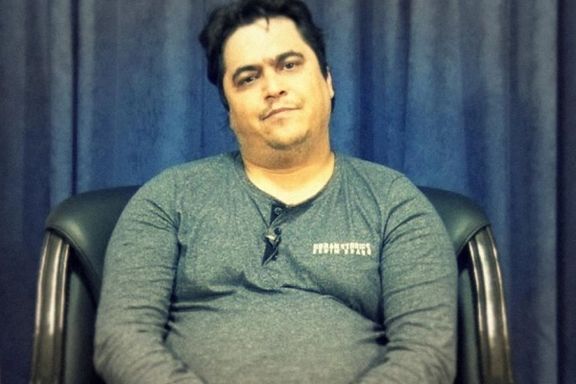
The Washington Post says the Islamic Republic of Iran is beefing up its plans to kidnap and kill opponents abroad with the help of gangsters and criminal groups.
The Washington Post said in an article on Thursday, that the expansion of the Islamic Republic's “terror and kidnapping plots” has worried officials in Western countries.
The article is based on government documents and interviews with 15 officials in Washington, Europe and the Middle East, who spoke on the condition of anonymity to discuss sensitive information.
It adds that the tempo of the plots has significantly increased in the past two years, and they are among the most ambitious and far-reaching in recent memory, according to the officials and documents.
The paper goes on to quote officials that the Islamic Republic’s intelligence and security services depend largely on proxies to carry out their plans, “offering hundreds of thousands of dollars to jewel thieves, drug dealers and other criminals in murder-for-hire schemes.”
The Revolutionary Guard Intelligence Organization and the IRGC Quds Force have been mentioned as two main actors in designing these plots.
The Iranians’ recruitment of agents appears as varied as the geographic distribution of their targets.
That hands-off approach probably caused some operations to fail, the officials said, as plots have been disrupted — and, in some cases, the hired hit men appear to have gotten cold feet and never carried out their orders.
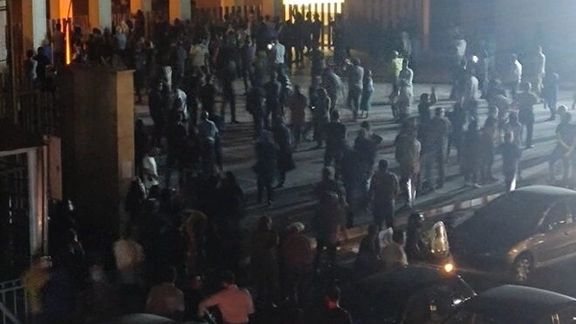
Despite repeated denials by IRGC's Fras news agency about a recent hack of its data servers, Iran's judiciary has started an investigation into damaging leaks.
Prosecutor General of Tehran Ali Alghasi-Mehr said on Wednesday that the probe into the cyberattack against Fars news, a cultural propaganda machine with close links to Iran’s Revolutionary Guard, is because a significant database of personal information of journalists and employees has been leaked.
However, it seems that the investigation has been launched because the authorities are not sure what has been hacked and what database has been breached.
A new word has been coined to refer to the large amount of data leaked from the hack: Farsgate.
A 123-page document, a copy of which Iran International obtained, is among the material the hacktivist group Black Reward uncovered. The document which includes both hearsay and excerpts from domestic and foreign-based Persian media was made in one copy only for the eyes of the IRGC chief commander Hossein Salami. Earlier in the week, Black Reward also released some audio files from a meeting between Qasem Qoreyshi, the deputy commander of the paramilitary Basij and media representatives.
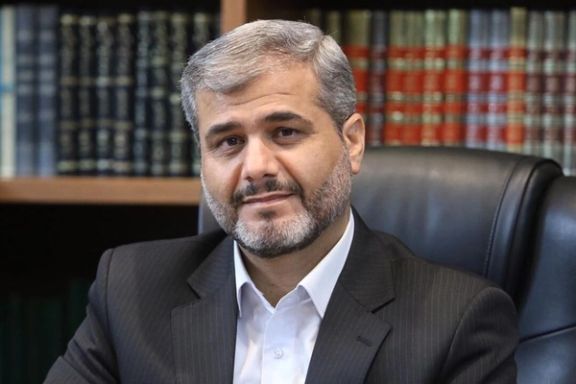
Black Reward announced on Friday, November 25, that it had attacked the database of Fars News Agency claiming that it deleted nearly 250 terabytes of data from all the servers and computers of the website and obtained confidential bulletins sent by the news agency to the office of the Supreme Leader Ali Khamenei. The report revealed a lot of recent orders by Khamenei about the ongoing protests that have engulfed the country since mid-September following the death of the 22-year-old Mahsa (Jina) Amini in the custody of morality police. Now, after several batches of information were leaked to the media, the authorities have started a damage control campaign to seize back the narrative, as most of the data prove that the Islamic Republic is frustrated and weary over its inability to end the protests.
The secret reports also revealed that most Iranians are getting ready for a revolution in the country as the popularity of the regime has dwindled, even among those considered supporters of the Islamic Republic. According to the documents, the level of dissatisfaction is so high that Khamenei has ordered some fundamental change in the structure of the regime in order to prevent a collapse.
The reports came as the protests in the country show no sign of ending and the movement has been spreading at universities and turning into strikes of employees in the industrial and services sectors, such as truckers.
While Iranian universities have turned into a battleground for antigovernment protests, students and professors in more than 150 universities around the world held events in support of the protests in Iran.
Meanwhile in Iran, Rasoul Jalili, the president of Tehran’s Sharif University of Technology, said on Wednesday that the university has increased its security staff by recruiting forces from private security companies. The measure is probably aimed at silencing those who criticize the university for allowing government security forces – especially the IRGC’s Basij paramilitary forces – to enter the campus to crack down on student rallies and sit-ins. If the measure proves successful, it can serve as a model for other universities to clamp down on students.
While Iranians have planned to hold three days of nationwide protests next week – 5-7 December – strikes by employees of industrial factories and truckers have injected fresh blood to the uprising.
Truck drivers and owners in several cities such as Esfahan, Bandar Abbas, Qazvin, and Kermanshah as well as many other western cities refrained from moving goods in support of the protests and strikes by industrial workers. Many people on social media describe the strike by the truckers as a significant blow to the Islamic Republic since it has the potential to cripple the economy. Some people say, “the truckers are leading the revolutionary uprising.”